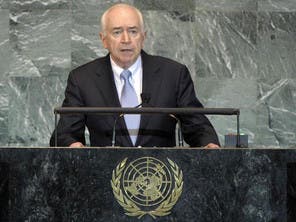By Amanda Fisher | Special to Al Arabiya News
Wednesday, 21 January 2015
Wednesday, 21 January 2015
 |
| Jim McLay at the U.N. General Assembly. (Reuters) |
New Zealand would seem an unlikely hope for the Palestinian people, but it has opened its third term on the U.N. Security Council – its first in 21 years – with strong words.
“New Zealand believes that failure of this U.N. Security Council to bring leadership to the [Israel-Palestine] issue, at this time, amounts to an abdication of its responsibilities,” the country’s U.N. Ambassador Jim McLay said on Jan. 15.
“Arguments that this Council doesn’t have a role, or that it can’t add value, can no longer be justified, particularly as other ways to find a solution haven’t succeeded.”
Experts tell Al Arabiya News that McLay’s remarks reflect New Zealand’s intention to be instrumental in the peace process and drive renewed efforts at a two-state solution.
In the final days of last year, the Security Council rejected a proposal by Jordan that would have fast-tracked a full Israeli withdrawal from the West Bank and East Jerusalem by 2017.
However, the Palestinians fell one vote short of the necessary nine, which would have triggered a U.S. veto.
The United States and Australia rejected the proposal, while the UK, Lithuania, Nigeria, South Korea and Rwanda abstained.
Regardless, Palestinian President Mahmoud Abbas almost immediately insisted the resolution still had life because of a new term of 10 non-permanent Security Council members.
“We didn’t fail. The U.N. Security Council failed us. We’ll go again to the Security Council. Why not?” he said shortly after the failed vote.
Palestinian Foreign Minister Riyad al-Maliki said he had “received assurances from the new members…that they would support the Palestinian demand to end the occupation,” U.S. Jewish news website Algemeiner Journal reported.
Reasons for hope
Why would New Zealand, to quote its parlance, give a ‘crikey dick’ about Palestinian self-determination?
There are several reasons, says Wellington’s Victoria University strategic studies professor Robert Ayson.
New Zealand likes to mark its identity through at-times politically unconventional stances. It was the first country to give women the vote in 1893, and has maintained a nuclear-free policy since 1984. New Zealand withstood political pressure and did not send troops to invade Iraq in 2003.
“Countries don’t take New Zealand lightly. We may not have a very big economy or defense force, but we carry a certain amount of moral authority,” said Ayson.
The country also has a proud history of activism, with violent anti-apartheid protests during a South African rugby tour in 1981, and anti-nuclear fervor in 1985 after two French spies bombed a Greenpeace ship in Auckland Harbour, killing a photographer.
The Palestinian issue is less about the will of the public, and more about New Zealand announcing its reemergence on the world stage, Ayson says.
“I don’t think it’s because there’s a massive groundswell. Israel-Palestine isn’t a big public issue. This is an issue New Zealand can [take up] without too many costs.”
No comments:
Post a Comment